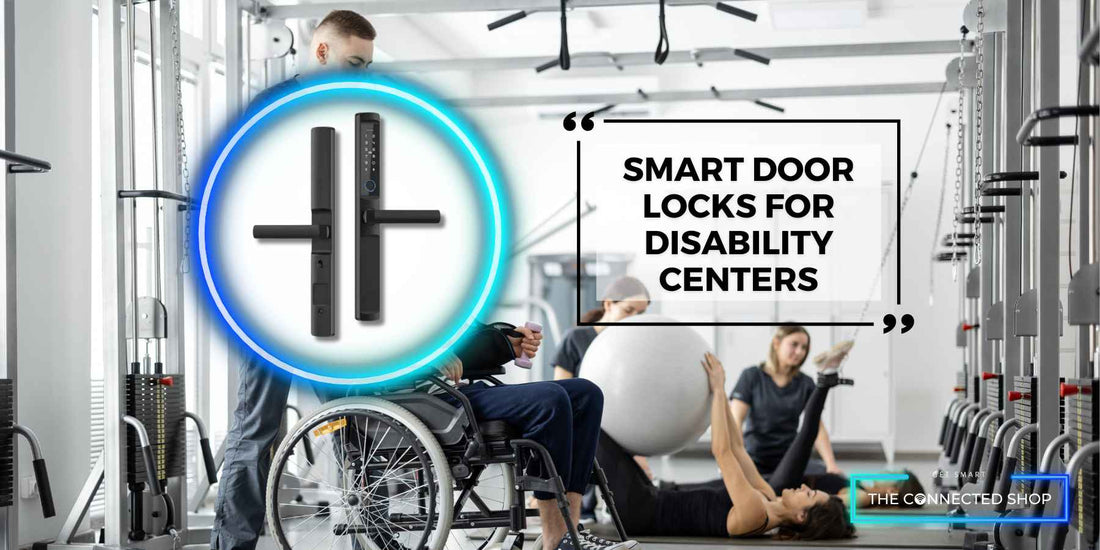Accessibility and security are important in disability centers, where creating a safe and supportive environment is essential. The integration of smart door locks offers a practical and impactful solution. These modern devices enhance convenience and security, simplifying access for residents and staff alike. By incorporating advanced technology, smart door locks improve everyday living and foster greater independence. Let’s discuss how smart door locks are making a significant difference in disability centers, from their benefits to real-world success stories. Discover how these innovative solutions are reshaping accessibility and safety in disability care.
Simplifying Access and Customizing Control for Residents with Disabilities
How Smart Door Locks Simplify Access for Residents with Disabilities
Smart door locks offer a range of features designed to make access easier and more convenient for residents with disabilities. Traditional locks and keys can be cumbersome and challenging to manage, especially for individuals with mobility issues or dexterity impairments. Smart door locks eliminate these barriers by providing various keyless entry options, such as:
Voice Activation: Residents can use voice commands to unlock doors, eliminating the need to handle keys or touchpads.
Mobile Apps: Smartphones can be used as digital keys, allowing residents to unlock doors with a simple tap or swipe.
Biometric Recognition: Fingerprint and facial recognition technology ensure that only authorized individuals can access specific areas, enhancing both convenience and security.
These features significantly reduce the physical effort required to enter and exit rooms, promoting greater independence and ease of movement for residents.
Customizable Access Control Settings to Cater to Individual Needs
One of the standout advantages of smart door locks is their ability to offer customizable access control settings tailored to the unique needs of each resident. Disability centers can configure these settings to ensure that each individual's access is both secure and convenient. Some ways this can be achieved include:
Personalized Access Schedules: Access can be granted or restricted based on specific times of day, ensuring that residents have the freedom to move around as needed while maintaining security during off-hours.
Temporary Access Permissions: Caregivers, family members, and visitors can be granted temporary access without the need for physical keys, simplifying the process of managing multiple users.
Zone-Based Access: Residents can be given access to certain areas while restricting entry to others. For example, a resident may have unrestricted access to their living quarters and common areas but restricted access to staff-only zones.
Emergency Override: In case of emergencies, authorized personnel can override access restrictions, ensuring quick and safe evacuation or entry when needed.
By providing these customizable options, smart door locks ensure that each resident's specific needs and preferences are met, enhancing their overall experience and quality of life within the disability center.
Streamlining Access and Simplifying Key Management for Staff
Streamlining Staff Access to Various Areas Within the Center
Managing access within a disability center can be a complex task, especially when different areas have varying levels of security. Smart door locks simplify this by providing a centralized and automated system that allows staff to easily access the areas they need. With the use of smart technology, staff can use keycards, mobile apps, or even biometric data to gain entry, eliminating the need for traditional keys. This not only speeds up access but also ensures that only authorized personnel can enter sensitive areas, enhancing overall security.
Reducing the Complexity of Key Management with Smart Technology
Traditional key management systems often involve a cumbersome process of tracking and distributing physical keys. This can lead to issues such as lost keys, unauthorized duplication, and difficulty in managing access rights. Smart door locks eliminate these problems by digitizing the entire process. Access permissions can be granted, revoked, or modified remotely, and all actions are logged for accountability. This reduces administrative overhead and minimizes security risks, allowing staff to focus more on their primary responsibilities rather than on managing keys.
Case Study: Wood County Board of Developmental Disabilities
The Wood County Board of Developmental Disabilities is dedicated to providing comprehensive support and services to individuals with developmental disabilities. Located in Ohio, the organization strives to create a safe, inclusive, and supportive environment for its residents and staff. With a focus on enhancing the quality of life for those they serve, the board continuously seeks innovative solutions to improve accessibility and security within their facilities.
Overview of the Implementation of Smart Door Locks at the Wood County Board of Developmental Disabilities
The Wood County Board of Developmental Disabilities recently took a significant step towards enhancing security and accessibility by integrating a Sliding Door Smart Lock into their facility. This implementation has showcased the profound impact that smart technology can have on operational efficiency and the safety of residents.
Advantages of the Sliding Door Smart Lock for the Staff
The introduction of the Sliding Door Smart Lock has provided several advantages for the staff at the Wood County Board of Developmental Disabilities:
Enhanced Security: Smart door lock ensures that only authorized personnel can access certain areas, reducing the risk of unauthorized entry and enhancing overall security. This is particularly important in environments where the safety and privacy of residents are paramount.
Ease of Access: Staff can now use keycards, mobile apps, or biometric authentication to quickly and easily unlock doors. This streamlined access control eliminates the need for traditional keys, reducing the time and effort required to manage physical keys.
Remote Management: The smart door lock can be managed remotely, allowing administrators to grant or revoke access as needed without having to be physically present. This flexibility is invaluable for maintaining security and accommodating the dynamic needs of the facility.
Activity Logging: Every entry and exit through the smart door lock is logged, providing a clear record of who accessed the door and when. This feature enhances accountability and allows for easy tracking in case of any security concerns.
Customizable Access Levels: Smart door locks allow for customizable access permissions, meaning that different staff members can be given varying levels of access based on their roles. This ensures that sensitive areas are only accessible to those who need to be there.
The successful implementation of the Sliding Door Smart Lock at the Wood County Board of Developmental Disabilities highlights the practical benefits of adopting smart technology in disability centers. Even a single smart lock can significantly enhance security, streamline operations, and improve the overall safety and well-being of both staff and residents.
Conclusion
The integration of smart door locks in disability centers represents a significant advancement in ensuring both ease and safety for residents and staff. These modern devices offer practical solutions to accessibility challenges, providing keyless entry options that cater to the specific needs of individuals with disabilities. By simplifying access and allowing for customizable control settings, smart door locks promote greater independence and ease of movement for residents.
For staff, smart door locks streamline access management, reduce the complexity of key distribution, and enhance security through features like remote management and activity logging. The case study of the Wood County Board of Developmental Disabilities illustrates how even a single smart lock can make a substantial impact on operational efficiency and security within a facility.
As disability centers continue to adopt and integrate smart technology, the benefits will become increasingly evident. Enhanced security, improved accessibility, and greater independence for residents are just a few of the advantages that smart door locks bring to these vital care environments. The future looks promising as more facilities embrace these innovative solutions, ultimately reshaping the landscape of accessibility and safety in disability care.





